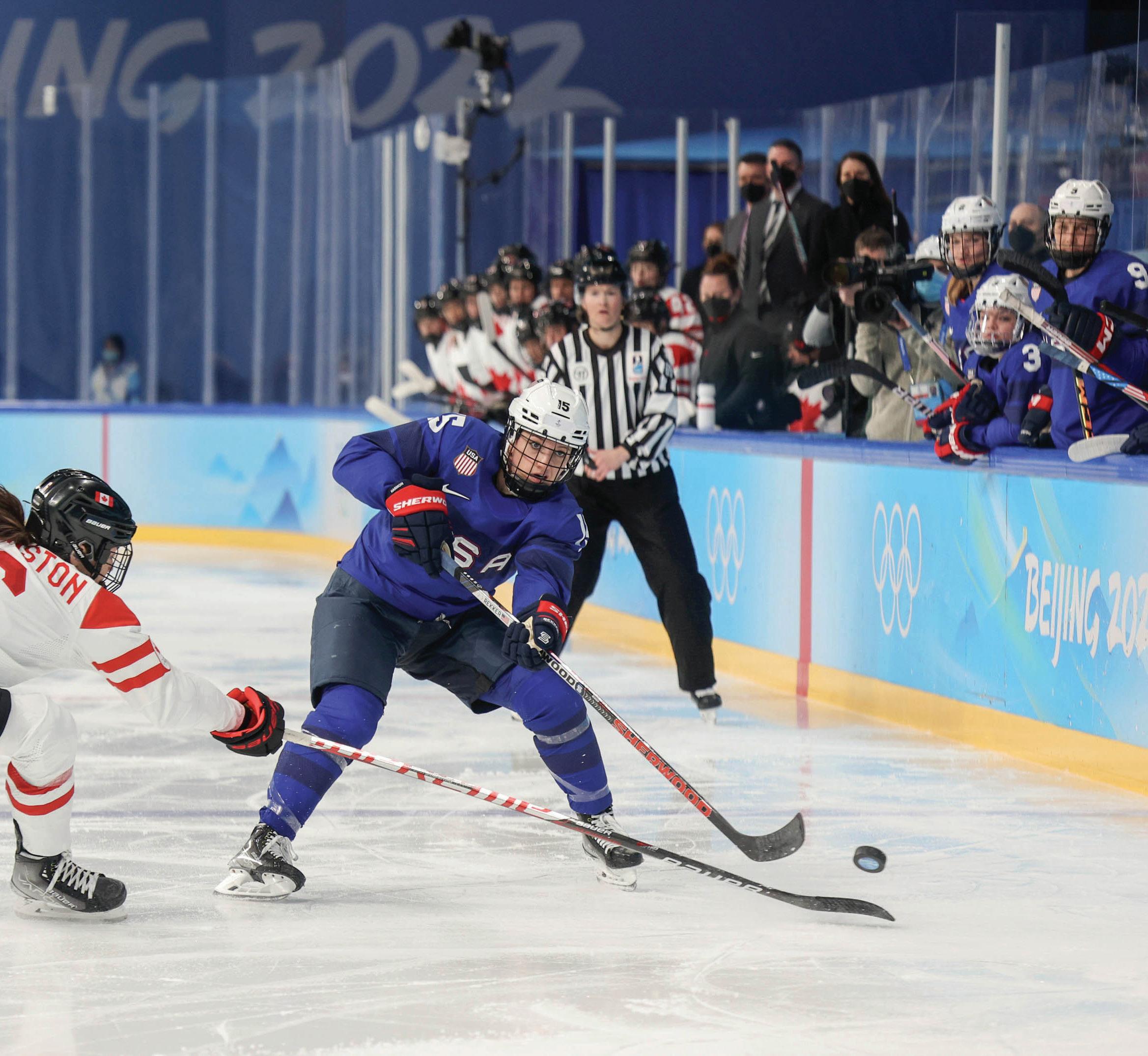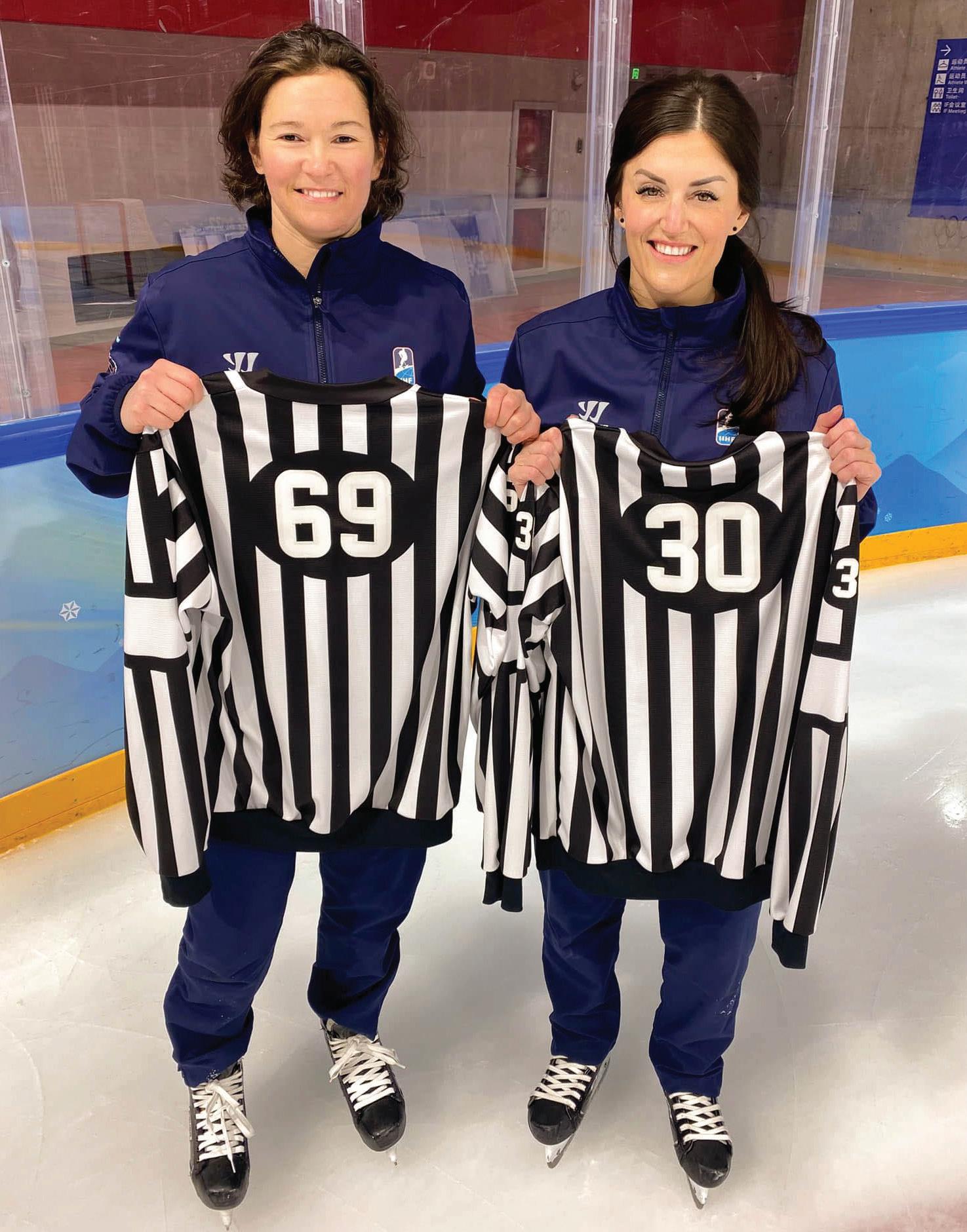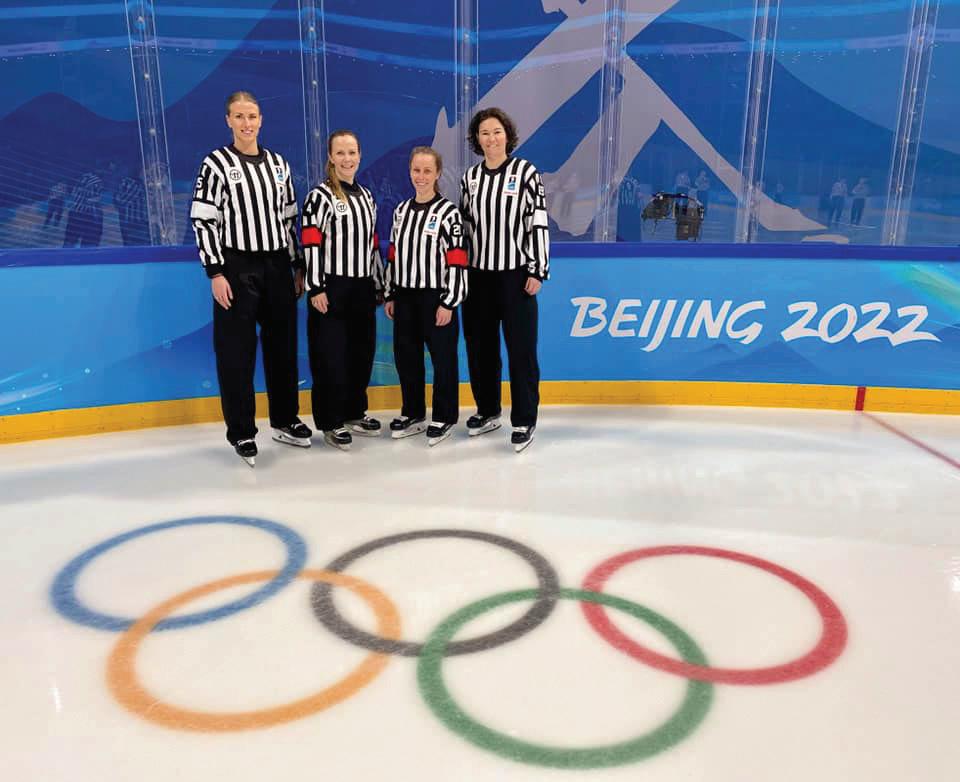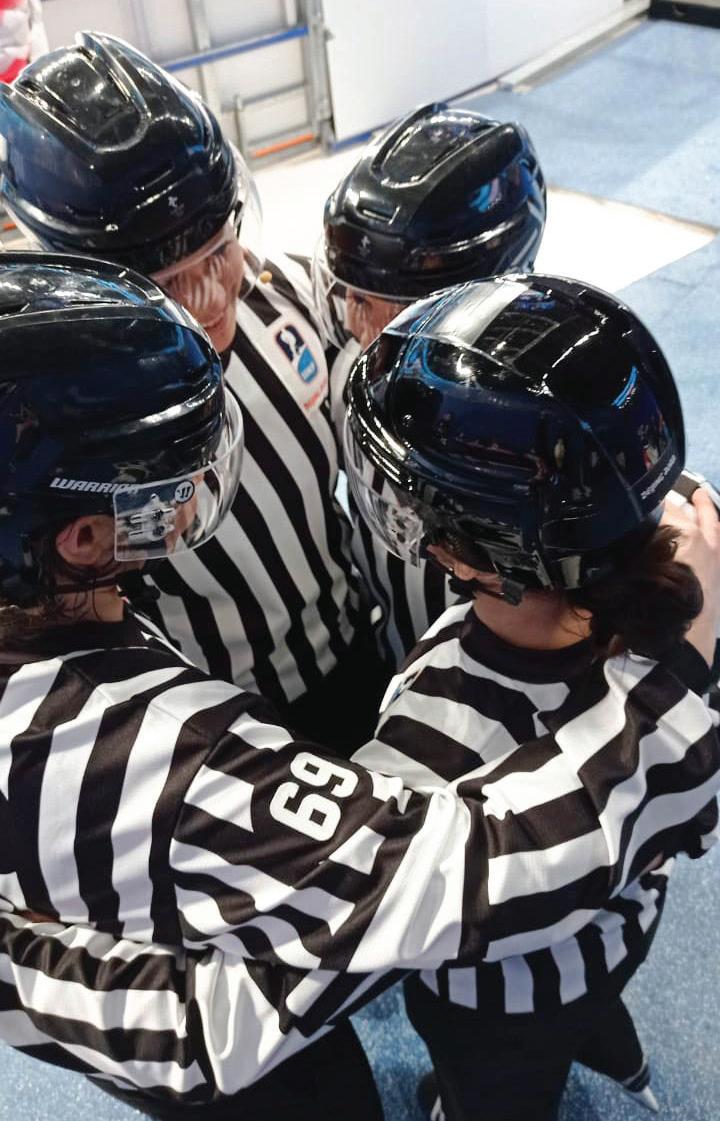
7 minute read
GOOD GOAL
Hockey official Kendall Hanley ’04 takes the ice at the Beijing Olympics
BY JONATHAN ADOLPH
Hockey fans eagerly tuned in to the Olympics last February to see the much-anticipated gold medal matchup between the top-ranked women’s teams from the United States and Canada. But no one was paying closer attention than Kendall Hanley ’04. As a linesperson for the international four-woman officiating crew, Hanley was on the ice with whistle in hand for the thrilling (some might say heartbreaking) 3–2 Canadian victory.
As with other Olympians, Hanley’s rise to the pinnacle of international sport was a multiyear journey that demanded perseverance, hard work, and personal sacrifice. Having reached the top of her profession with a cohort of other women who now officiate hockey at every level short of the National Hockey League, she continues to break barriers in her new position as manager of officiating for the North American Hockey League, a top junior league. Still, working the Olympics was a particular thrill.
“It’s just such an honor and a privilege to be able to do what you love, and do it at the highest level,” explains Hanley, who was one of 22 women officials selected for Beijing. “It’s amazing what you get out of it: camaraderie, working together as a team, and serving the game. Those are all the things that as a player, you think, This is why I do this.”
And Hanley knows well the joys of being a player, having transferred her junior year from North Carolina to skate with the Wildcats (she also played volleyball, soccer, and softball at Williston). Determined to compete at the
HARRY HOW GETTY IMAGES On the ice in Beijing, Hanley (in rear) works the preliminary round game between Team USA and Team Canada


Left: Hanley (left) and fellow lineswoman Jackie Spresser display their Olympic jerseys honoring their friend and fellow official Jamie Huntley-Park, a police officer who was killed in a car accident in 2021. Huntley-Park’s badge number was 6930.
Above: A four-woman officiating crew, with its two referees (middle, with red armbands) and two lineswomen, including Hanley at right
collegiate level, she stayed through a postgraduate year and soon established herself as a team leader both on and off the ice, recalls Christa Talbot Syfu ’98, then just beginning her Williston hockey coaching career. “She was a phenomenal player,” Talbot Syfu says. “Very skilled, and more mature than many of her teammates. She was probably head and shoulders better than anybody else on the team.”
That talent would lead Hanley to women’s hockey powerhouse Elmira College, then to SUNY Oswego, where she transferred to pursue a degree in zoology. But it was her experience off the ice at Williston that she says provided the strongest foundation for her success in hockey today. Officiating demands “a lot of time management,” explains Hanley, who when not traveling to games and tournaments lives in Minneapolis with her partner, her partner’s mother, and her golden Labrador. “I learned at Williston how to balance my schedule, how to manage my time, attention to detail, and being able to operate independently. These are all invaluable life skills. I grew as a person at Williston, and that allowed me to be successful in my role.”
Officiating wasn’t something she even considered as a player, though she certainly was familiar with the refs. “I had a lot of penalty minutes,” she says with a laugh. “There’s a fun photo of me as a kid sitting in the penalty box with my dad, who was the penalty bench attendant. I’m like, ‘Yup, this is how we spend family time.’”
Her perspective shifted when she happened to meet another skilled skater at a pick-up hockey game in Texas, where she had moved the summer after college to be near her father and work at the Dallas Zoo. The woman was a hockey official working her way up the development ladder, earning the various credentials required by USA Hockey, the sport’s governing body in the U.S., and the International Ice Hockey Federation (IIHF). “It was this whole new world I had no idea existed,” she recalls. “It sounded kind of fun.”
Officiating would become her new focus, along with stints coaching and directing youth hockey programs. Balancing the demands of her hockey work and other jobs was not always easy, but by 2016 she had earned her top-level IIHF license as a linesperson, as well as a license to referee at lower levels. (The linesperson’s primary task is watching for offsides, when a player crosses the blue line ahead of the puck. They also drop the puck for face-offs, separate belligerent players, and, depending on the league and its rules, call certain penalties.)
Those who question whether women can officiate at the NHL level often cite the physical requirements of the job, but Hanley quickly dismisses that argument. “I’ve broken up a lot of fights over my days,” she points out. “We’re just as agile, physical, and physically fit. I think the sky’s the limit for everybody at this point.” As for other physical risks, Hanley shrugs them off with a hockey player’s characteristic stoicism. “Oh, I had a puck to the face a couple years ago,” she points out. “But, I mean, you’re going to get hurt doing anything in life.” And as if to demonstrate that point, during the preliminary U.S.-Canada women’s game in Beijing, referee Cianna Lieffers was cut on the face by an errant stick. Canada’s trainer stitched her up, and Lieffers soon returned to the ice.
The determination and closeness of the officiating community were on display throughout the Olympics in the jersey numbers worn by Hanley and her fellow linesperson Jackie
Spresser. In June 2021, their good friend, referee Jamie Huntley-Park, and her husband—both San Diego police detectives—were tragically killed by a wrong-way driver. The loss was particularly painful for Hanley, who had been teammates with Huntley-Park at Elmira. To honor her memory, Hanley and Spresser decided to wear numbers 69 and 30 during the games, representing Huntley-Park’s police badge number, 6930. “She was on track to be a part of this group,” says Hanley. “Obviously our hearts were hurting that she was missing, but she was with us there the whole time.”
And as a further tribute to Huntley-Park’s life and work, Hanley and others this spring will be taking on the management of a development program for women officials founded and run by their friend. “The goal is to keep it going and continue to provide those opportunities for female officials,” she says. “We’re incredibly grateful and honored to be able to continue Jamie’s camp and her legacy.”
That resilience in the face of adversity is another character trait Hanley says Williston helped her develop. “Williston allowed me to be comfortable with who I am. I learned that it’s OK to take different paths, try different things, and it’s not necessarily a failure if you don’t make your goals,” she explains. “It’s that growth mindset. You learn and say, ‘Well, how am I going to do this differently next time? How can I spin this into a positive?’”
A gold-medal game plan, in sports and in life.

Hanley huddles with her crew
SO, YOU THINK YOU CAN BE A HOCKEY REF?
For the purposes of this quiz, assume the Wildcats are playing by the rules of the International Ice Hockey Federation rulebook (Version 1.1, September 2021)
1. A Wildcat player shoots the puck at the opponent’s net from behind the center red line. The opposing goalkeeper freezes the puck, causing a stoppage of play. What happens next?
A. Both teams can change players. The face-off is in the opposing team’s defensive end. B. The opposing team cannot change players. The face-off is in the opposing team’s end, on the same side of the ice as where the shot originated. C. The opposing team cannot change players. The
Wildcats get to choose which of the two face-off circles to use for the puck drop in the opposing team’s end. D. The officials assess a minor penalty to the goalie for delay of game.
2. The Wildcat’s center wins the face-off by kicking the puck to her teammate. What happens next?
A. Play on! This is a legal play! B. The officials stop play and assess a minor penalty to the
Wildcats for delay of game. C. Officials stop play and assess a warning for a face-off violation to the Wildcats. The clock is reset, and the center can retake the face-off. D. Officials stop play and require another player to take the face-off.
(Correct answer for both is c.)










